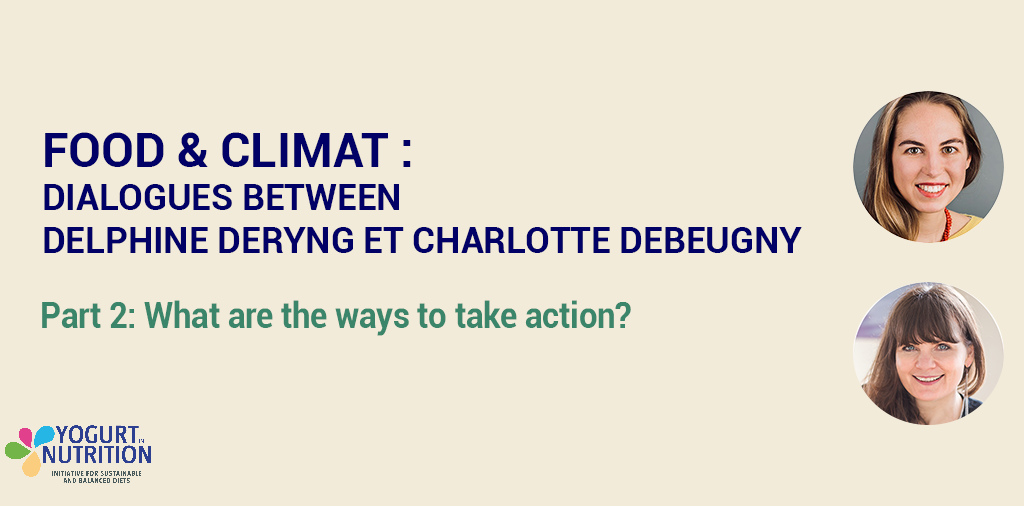Food and Climate: Dialogues between a climate and agriculture scientist and a nutritionist
Delphine Deryng is a climate and agriculture scientist, specializing in the issues of risk and adaptation of the agri-food sector to climate hazards, and mitigation of greenhouse gas emissions. Delphine is the lead author of the second part of the IPCC‘s sixth report, published in 2022.
Charlotte Debeugny is a registered nutritionist under British law and passionate about science and healthy cooking. We thought it would be interesting to cross their approaches and points of view. We invite you to discover this interview, through 3 episodes. This interview is in french, subtitled in english.
What are the ways to take action?
It is essential to draw up a state of knowledge to identify the negative effects that can be acted upon, both on an individual scale and on a collective, national or international scale. For instance, limiting the use of pesticides and chemical inputs, specifically selecting the use of fertilizers, reducing methane emissions, especially from livestock, and limiting food loss and waste.
“There are solutions to make food systems more resilient and sustainable – Delphine Deryng “
30 to 40% of food production is lost or wasted during the different stages of the food chain. In less developed countries, losses are mainly at the level of post-production, due to storage and conservation, whereas in developed countries, losses and waste are more likely to occur at the consumer level.
In terms of waste, there are definitely things to do on an individual level:
- Look at consumption dates
- Encourage the use of “doggy bags” in restaurants
- Don’t hesitate to save leftovers and reuse them in the kitchen
Implementing more sustainable and healthier diets may require more preparation and anticipation. It is definitely possible to adopt simple techniques to gradually move towards a more eco-friendly diet on a daily basis, without requiring too much preparation or cooking techniques.
For instance, it is easy to use canned legumes (chickpeas, lentils, dried beans…), already cooked, and easy to reheat, with nutritional values that are still interesting ( be careful with the salt in some cans).
Thus, on an individual scale, there are tricks to change one’s habits without requiring too much effort and to have a sustainable approach, whether it is in the reduction of food waste or in one’s diet.
To be continued in a few days, the next part of this interview, on the ways to act on a global and individual scale…
 Delphine Deryng is a climatologist specializing in the issues of risk and adaptation of the agri-food sector to climate hazards, and mitigation of greenhouse gas emissions. Delphine is lead author of the second part of the IPCC’s sixth report, published in 2022. She is also a visiting scholar at Humboldt University in Berlin since 2018. Delphine holds a PhD in Environmental Science from the University of East Anglia, a Master’s degree in Geography from McGill University and a Master’s degree in Physics and Cosmology from the University of Paris Diderot.
Delphine Deryng is a climatologist specializing in the issues of risk and adaptation of the agri-food sector to climate hazards, and mitigation of greenhouse gas emissions. Delphine is lead author of the second part of the IPCC’s sixth report, published in 2022. She is also a visiting scholar at Humboldt University in Berlin since 2018. Delphine holds a PhD in Environmental Science from the University of East Anglia, a Master’s degree in Geography from McGill University and a Master’s degree in Physics and Cosmology from the University of Paris Diderot.

Charlotte Debeugny
(RNutr) is a British registered nutritionist. A nutrition expert who is passionate about science and good food. She is very aware that healthy food choices are also good for the planet. She also chairs a FENS (Federation of European Nutrition Societies) working group that focuses on improving the quality of scientific communication about nutrition to the public.
For more information:
- The Intergovernmental Panel on Climate Change (IPCC) was established to provide comprehensive assessments of the state of scientific, technical and socio-economic knowledge about climate change, its causes, impacts and coping strategies. The panel is now in its 6th assessment cycle. All data is available online.



